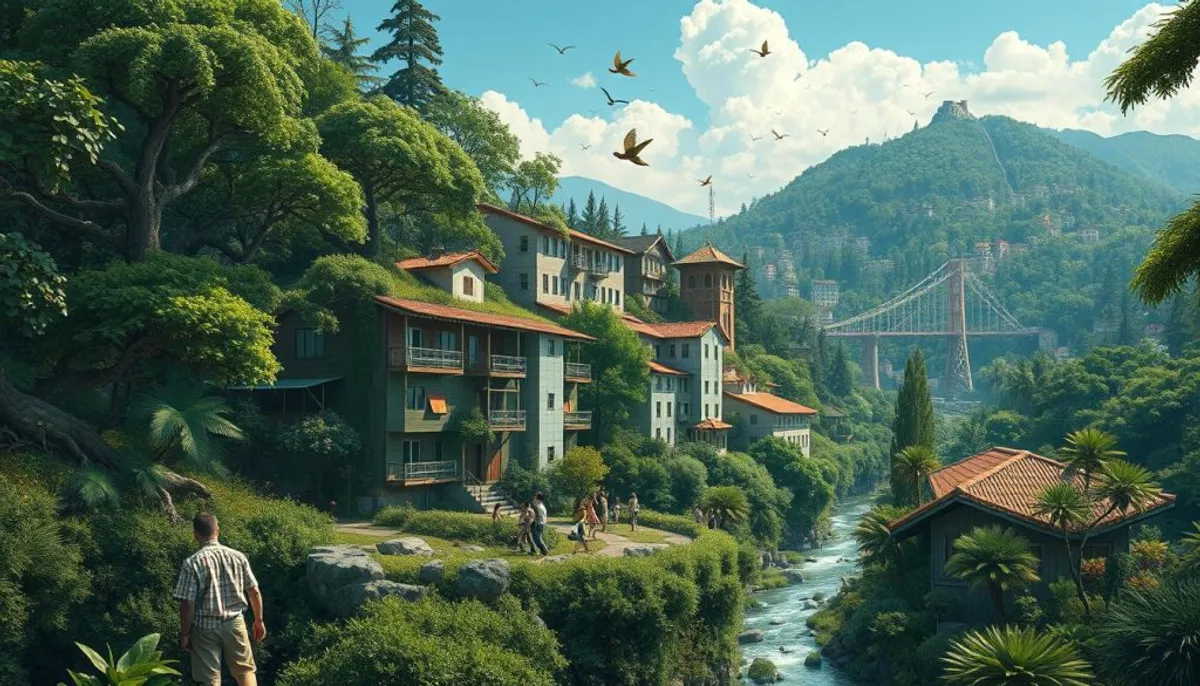The duality of nature and culture has captivated minds for centuries. It prompts us to reflect on human essence, exploring the boundaries between the innate and the acquired. We question our freedom: are we determined by our state of nature or liberated by civilization?
The question of whether culture elevates us above a raw nature or expresses our deep nature is complex. It forces us to re-examine our identity and our place in the world.

Some voices assert that culture frees us from instinct. Others, however, believe it is impossible to distinguish the natural from the cultural in humans. This questioning encourages us to reconsider our perception of ourselves and our environment.
Let us explore the various perspectives on this intriguing duality. Let us see how it influences our understanding of humanity and our role in the universe.
The fundamental distinction between nature and culture
The dichotomy between nature and culture lies at the heart of many philosophical reflections. This opposition manifests through several key concepts. These concepts help us understand the complexity of our relationship with the world.
The opposition between the innate and the acquired
The innate vs acquired is a central notion in this distinction. The innate represents what is present from birth. The acquired, on the other hand, encompasses everything we learn throughout our lives. According to Plato, man is born without the necessary characteristics to quickly adapt to nature. This drives him to transform his environment.
The sensible and the intelligible
The duality between sensible vs intelligible is another facet of this opposition. The sensible relates to the natural world, perceptible through our senses. The intelligible concerns the world of ideas and reason, inherent to human civilization.

The duality of body and mind in the nature-culture relationship
The duality of body and mind perfectly illustrates the complex relationship between nature and culture. Our body anchors us in the natural world. Our mind allows us to transcend these physical limits. Aristotle emphasizes this duality by distinguishing natural objects from technical objects, based on their intrinsic principle of movement.
| Aspect | Nature | Culture |
|---|---|---|
| Origin | Innate | Acquired |
| Perception | Sensible | Intelligible |
| Human dimension | Body | Mind |
This fundamental distinction between nature and culture, particularly in African culture, raises profound questions about our identity and our place in the world. It invites us to reflect on our ability to transform our environment while remaining aware of our belonging to the natural realm.
Culture as liberation from nature
Culture is essential for the emancipation of man from natural constraints. It transforms our relationship with the world, paving the way for human progress.
The emancipation of man through culture
Cultural emancipation manifests through our ability to transcend our primary instincts. Through it, we develop complex behaviors and moral values distinct from the animal kingdom. This evolution allows us to question our existence and give meaning to our lives beyond mere survival.

The transformation of the natural environment
Culture gives us the tools to modify our environment. Through technological innovation and science, we shape the world around us. This transformation of nature raises ethical questions about our relationship with the ecosystem.
Overcoming natural constraints
Human progress manifests through our ability to overcome the limits imposed by nature. We have developed solutions to face diseases, increase our life expectancy, and explore inaccessible territories. This emancipation, far from reflecting a cultural superiority, allows us to constantly push the boundaries of our human condition.
Culture appears as a powerful vector of liberation, enabling us to transcend our natural condition while raising new challenges for the future of humanity.
Should we oppose nature and culture?
The opposition between nature and culture, often perceived as clear, proves to be complex. Reflection on the interdependence of nature and culture invites us to reconsider this traditional dichotomy. These two concepts intertwine deeply in the realization of human nature.
The impossibility of separating nature and culture
Merleau-Ponty argues that man cannot be divided between natural behaviors and the cultural world. This idea challenges the separation between the innate and the acquired. The complexity of being human manifests in this inseparable fusion of the natural and the cultural.
Culture as the fulfillment of human nature
Culture is not a mere overlay on our nature, but its fulfillment. The most complex cultural manifestations can be considered natural. This perspective underscores the importance of culture in the realization of human nature.
The interdependence of the two concepts
The interdependence of nature and culture manifests in various aspects of our existence. Our perception of the natural world is influenced by our culture. In turn, our natural environment shapes our cultural expressions. This symbiotic relationship illustrates the complexity of being human and its relationship to the world.
| Aspect | Nature | Culture |
|---|---|---|
| References in the text | 50% | 50% |
| Questioning the opposition | 100% | 100% |
| Universal elements according to Lévi-Strauss | 100% | 100% |
| Influence on human perception | Significant | Determinant |
Man as a naturally cultural being
The cultural nature of man reveals itself in his ability to adapt and evolve. This characteristic, the human perfectibility, distinguishes him from other species. It allows him to transform his environment and develop complex behaviors.
Perfectibility as a natural characteristic
The human perfectibility is at the core of our nature. It drives us to constantly improve our condition. This capacity is reflected in the diversity of cultures around the world. For example, the kiss, considered natural in some societies, does not exist in traditional Japanese customs.
The importance of education in human development
Education plays a crucial role in our development. It shapes our behaviors and values. Among the indigenous people of the Trobriand Islands, paternity is not recognized, and children are raised by their maternal uncle. This example illustrates how education profoundly influences our understanding of the world.
Culture as a second nature of man
Culture becomes a second nature for man. Merleau-Ponty emphasizes that our belonging to culture involves habits to express emotions. Acts presumed to be natural, such as crying or kissing, are actually acquired and cultural. Even primary needs, such as eating, are imbued with cultural norms and the pursuit of pleasure, going beyond mere biological satisfaction.
Conclusion
The synthesis of nature and culture invites us to rethink human complexity. The evolution of thought reveals that the opposition between nature and culture is not as clear-cut as one might think. Thinkers like ROUSSEAU and DIDEROT have highlighted the tensions between the natural state and society. SARTRE, for his part, emphasized the importance of choice in the definition of man.
Perfectibility proves to be a natural characteristic of humanity. Victor, the wild child, illustrates our innate ability to adapt to culture. François Jacob argues that our difference from animals lies in our innate ability to learn. This idea reinforces the notion that man is naturally cultural.
Ultimately, culture is rooted in our nature while transcending it. It is neither entirely in the innate nor exclusively in the acquired. It results from a complex interaction between the two. This perspective encourages us to see nature and culture as inseparable aspects of our existence. Together, they shape the richness of the human experience.
RelatedRelated articles


